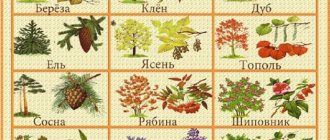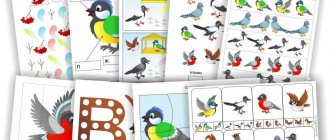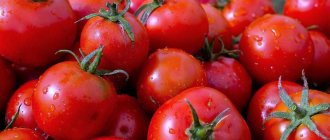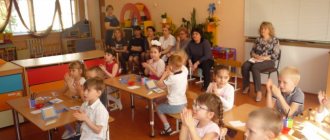“Speech therapy lesson on the lexical topic “Vegetables” with homework”
Summary of a subgroup speech therapy lesson in the senior group on the topic “Vegetables”
Lesson No. 1
Purpose of the lesson:
formation of the lexical and grammatical structure of speech on the lexical topic “Vegetables”.
Tasks:
Correctional and educational:
- Systematize knowledge about vegetables, activate your vocabulary on this topic.
- Learn to form the plural of nouns.
- Learn to form nouns with diminutive suffixes.
- Practice forming relative adjectives and agreeing adjectives with nouns.
- Practice the correct use of the prepositions “on, in.”
Correctional and developmental:
- Develop articulatory motor skills.
- Develop gross and fine motor skills.
- Develop the lexical and grammatical structure of speech.
- Develop memory, attention, thinking.
Correctional and educational:
- Foster independence and the ability to listen to children’s answers.
- Cultivate kindness and a desire to help others.
Equipment:
- magnetic board,
- pictures of vegetables,
- plot picture “Vegetable Garden”,
- ball,
- mirrors
OD move:
1. Organizational moment.
Speech therapist:
Guys, the Gnome came to visit us, and he prepared a lot of interesting games. But first, guess his riddle:
They are different, They ripen in vegetable gardens, They are called in one word, Mom adds them to borscht!
Children:
Vegetables!
Speech therapist: Correct. The topic of today's lesson is vegetables. Listen and guess what vegetable it is.
A girl grew underground, but fresh and round-faced. The dog Artoshka barks loudly: - Woof-woof-woof - hello,...! (potato)
One hundred clothes - All without fasteners. (cabbage)
A beautiful maiden sits in prison, and her braid is on the street. (carrot)
2. Main part.
Speech therapist
: Guys, tell the Gnome what other vegetables do you know?
Children:
cucumber, tomato, zucchini, onion, beets.
( Vegetables are attached to the magnetic board one by one).
Speech therapist:
Do you know that vegetables grow in garden beds (
a picture “Vegetable Garden” is attached to the board).
Some vegetables grow on the ground, these include tomatoes, cucumbers, and cabbage. Some vegetables grow in the ground, these include potatoes and carrots. What other vegetables grow in the ground, name them. When vegetables are ripe, they need to be harvested. Vegetables that grow on the ground are picked and cut. Vegetables that grow in the ground are dug up and pulled out.
1) Finger gymnastics
Guys, we have already said that vegetables grow in the garden in the garden. Let's see how many vegetables grow in our garden.
There are a lot of vegetables in our garden. Let's count them, it will become more fun. (we squeeze and unclench our fingers)
Carrot, onion and cucumber, tomato and pepper. ( we bend our fingers, starting with the thumb
)
Five types of vegetables were named, Five fingers were clenched into a fist. ( we squeeze and unclench our fingers)
2) Massage of biologically active points of the face “Peas”.
There were peas in the store - massage your cheeks in a circular motion.
The pea screamed: “Oh - Oh!”
– massage the ears with movements from top to bottom
Here I am, kids, look, don’t look at the candies –
massage the outer corners of the eyes
Well, buy me quickly –
press on the wings of the nose with your index fingers.
There is no benefit from sweets -
we use our index fingers to massage the corners of our lips
. I need it more than a hundred sweets!
– press your palms to your cheeks.
3) Game “Name it kindly”
Speech therapist:
Our guest lives in a magical land where all objects are small, so they call everything affectionately. Now we will try to affectionately name vegetables:
Children:
cucumber - cucumber, tomato - tomato, cabbage - cabbage, potato - potato, onion - onion.
4) Game “One - Many”
Speech therapist:
Guys, Gnome has prepared the next game for you. Now I will tell you one vegetable, and you will tell me when there are many of them.
Children:
cucumber - cucumbers, onion - onions, zucchini - zucchini, tomato - tomatoes.
5) Physical exercise “Planting a vegetable garden”
Speech therapist:
The gnome loves to eat vegetables all year round, but he just forgot what he needs to do to reap a good harvest. Let's remember together. Watch and repeat after me.
We took the shovels and dug up the beds. They took the rake in hand and leveled the beds. We planted the seeds in rows together, and then watered them with warm water.
6) Didactic game “Harvesting”
Speech therapist:
A good harvest has grown in the garden, let's harvest it. Tell me, which vegetables do I pick, which ones do I pull out, which ones do I cut, and which ones do I dig up?
Picked: ( tomato, cucumber
), Pull out: (
onions, carrots
), Cut:
(zucchini, cabbage
), Dig out: (
potatoes
).
7) Game "Cooking"
Speech therapist:
Guys, tell me what can be cooked from vegetables?
Children:
juice, soup, salad...
Speech therapist:
Think and tell me, carrot juice - what kind of juice?
Children:
Carrot.
Juice: carrots, cucumber, tomato.
Salad: cabbage, cucumber, vegetables. Soup: tomato, potato, vegetables. Speech therapist:
Well done!
 Didactic game "Cook"
Didactic game "Cook"
Speech therapist:
Let's prepare a treat (
soup or salad
).
Choose the right vegetables for the dish, name them and explain how you will prepare this “treat” ( take, wash, peel, cut, cook
).
9) Speech therapist:
Guys, let's remember which vegetables grow underground and which on the ground.
The speech therapist throws a ball to the child and names a vegetable.
Children: Carrots grow underground, etc.
Summary of the lesson.
Repetition and generalization of the material that children learned in class.
Speech therapist:
Children, our guest liked the way you answered his riddles and willingly played. Let's repeat what is shown in the pictures, where vegetables grow, and what can be cooked.
- Well done, guys, the gnome has prepared a surprise for you, he brought you magic leaves, on them you will find different vegetables!
Home speech therapy assignment for the senior group, on the lexical topic: “Vegetable garden.” Vegetables" -
GARDEN. VEGETABLES.
Parents are recommended:
· consider natural vegetables at home with your child: potatoes,
cucumber, carrots, cabbage, beans, beets, pumpkin, radishes, peas, onions, peppers;
· pay attention to the following signs of vegetables: color, shape, taste;
· if possible, tell and show the child where and how vegetables grow, what they are prepared from (soup, salad, vinaigrette...).
Expanding children's vocabulary:
Titles:
cucumber, tomato (tomato, potato, beet, carrot, onion, turnip, cabbage, radish, pepper, garlic, eggplant, zucchini, squash, greens, parsley, dill, radish, pumpkin, beans, beans, peas, pod, tops, roots, fruits, seeds, tubers, leaves, cabbage, lettuce, beetroot, vinaigrette, juice, bag, box, fertilizer, pests, harvest, vegetable garden, bed, soil, planting, watering, weeding.
Signs:
red, green, yellow, ripe, unripe, tasty, tasteless, sweet, sour, bitter, salty, raw, pickled, canned, boiled, healthy, round, oval, elongated, oblong, smooth, ripe, fragrant, aromatic, juicy, vegetable.
Actions:
plant, care, grow, sow, loosen, ripen, water, ripen, collect, sprinkle, pull out, dig, cut, wash, grate, cook, stew, fry, eat, crunch, prepare, salt, ferment, can, pickle, dry.
1.
“ Harvest .
The child must be able to explain why it is this way and not otherwise.
Carrots, beets, turnips, radishes are pulled out;
Cucumbers, tomatoes, zucchini, peas - pick;
Cabbage - cut;
Potatoes are dug up.
2. “Call it affectionately”
(formation of nouns in diminutive form).
cucumber - cucumber
tomato ‒
tomato
pepper‒
pepper
onion‒ onion
peas‒
peas
carrots‒
carrots
3. “What did we eat?”
(formation of a noun in the plural of the instrumental case)
Tomatoes - we are full of tomatoes Cucumbers - we are full of cucumbers
Peppers - we are full of peppers Eggplants - we are full of eggplants
Beans - we're full of beans Zucchini - we're full of zucchini
4. “Tell me which one? Which?" (selection of homogeneous adjectives for nouns)
What kind of pumpkin? –
orange, round, sweet, large, fragrant,...
tomato ?
‒
round, soft, juicy, sweet and sour, vitamin-rich,...
What vegetables
‒
healthy, tasty, juicy, ripe, colorful,...
5. “There is - there is no”
(genitive singular)
eggplant - there is no eggplant
potatoes -
no potatoes
onions -
no onions
parsley - no parsley
vegetable garden -
no vegetable garden
land -
no soil
bed - no bed
root -
no root
stem -
no stem
6. “What shall we prepare”
(formation of relative adjectives from nouns)
From potatoes - mashed
potatoes
From pumpkin -
pumpkin porridge
From cucumbers -
cucumber salad
From tomatoes -
salad, tomato juice
From carrots - carrot juice
From peas –
pea soup
From squash – squash caviar
From garlic -
garlic sauce
7. Retelling the story using leading questions. WHO IS DRESSED HOW?
The days have become stormy, the nights are getting colder. They began to harvest vegetables from the gardens so that they would not spoil or freeze. First, the bare cucumbers were removed. Then onions in paper shirts. Then beans in woolen stockings. We removed turnips, rutabaga, radishes, carrots, beets and various parsley. One cabbage left. It is removed later than everyone else. She, the cabbage, has seventy clothes, she is not afraid of the cold!
1.
When are vegetables harvested?
2.
What vegetables were harvested from the gardens?
3.
What's left in the garden?
4.
Cabbage has seventy clothes.
Why do they say this? 5.
(The child must remember the riddle about cabbage).






